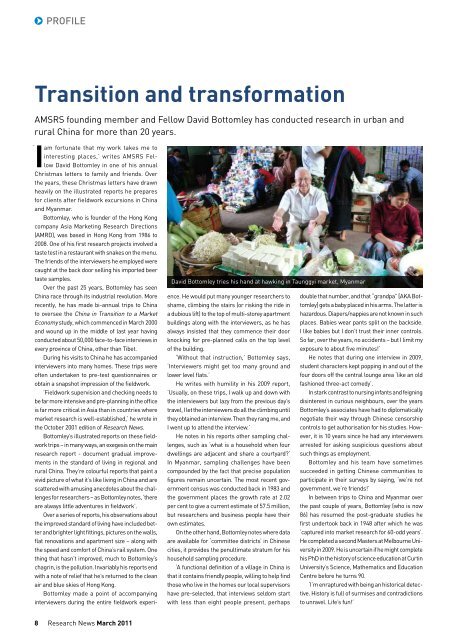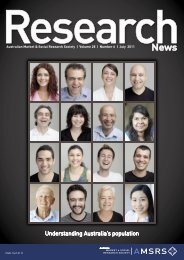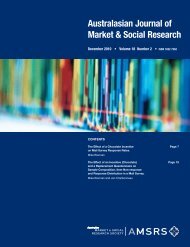Asia Pacific region - aprc-research
Asia Pacific region - aprc-research
Asia Pacific region - aprc-research
You also want an ePaper? Increase the reach of your titles
YUMPU automatically turns print PDFs into web optimized ePapers that Google loves.
PROFILE<br />
Transition and transformation<br />
AMSRS founding member and Fellow David Bottomley has conducted <strong>research</strong> in urban and<br />
rural China for more than 20 years.<br />
‘<br />
I<br />
am fortunate that my work takes me to<br />
interesting places,’ writes AMSRS Fellow<br />
David Bottomley in one of his annual<br />
Christmas letters to family and friends. Over<br />
the years, these Christmas letters have drawn<br />
heavily on the illustrated reports he prepares<br />
for clients after fieldwork excursions in China<br />
and Myanmar.<br />
Bottomley, who is founder of the Hong Kong<br />
company <strong>Asia</strong> Marketing Research Directions<br />
(AMRD), was based in Hong Kong from 1986 to<br />
2008. One of his first <strong>research</strong> projects involved a<br />
taste test in a restaurant with snakes on the menu.<br />
The friends of the interviewers he employed were<br />
caught at the back door selling his imported beer<br />
taste samples.<br />
Over the past 25 years, Bottomley has seen<br />
China race through its industrial revolution. More<br />
recently, he has made bi-annual trips to China<br />
to oversee the China in Transition to a Market<br />
Economy study, which commenced in March 2000<br />
and wound up in the middle of last year having<br />
conducted about 50,000 face-to-face interviews in<br />
every province of China, other than Tibet.<br />
During his visits to China he has accompanied<br />
interviewers into many homes. These trips were<br />
often undertaken to pre-test questionnaires or<br />
obtain a snapshot impression of the fieldwork.<br />
‘Fieldwork supervision and checking needs to<br />
be far more intensive and pre-planning in the office<br />
is far more critical in <strong>Asia</strong> than in countries where<br />
market <strong>research</strong> is well-established,’ he wrote in<br />
the October 2001 edition of Research News.<br />
Bottomley’s illustrated reports on these fieldwork<br />
trips – in many ways, an exegesis on the main<br />
<strong>research</strong> report - document gradual improvements<br />
in the standard of living in <strong>region</strong>al and<br />
rural China. They’re colourful reports that paint a<br />
vivid picture of what it’s like living in China and are<br />
scattered with amusing anecdotes about the challenges<br />
for <strong>research</strong>ers – as Bottomley notes, ‘there<br />
are always little adventures in fieldwork’.<br />
Over a series of reports, his observations about<br />
the improved standard of living have included better<br />
and brighter light fittings, pictures on the walls,<br />
flat renovations and apartment size – along with<br />
the speed and comfort of China’s rail system. One<br />
thing that hasn’t improved, much to Bottomley’s<br />
chagrin, is the pollution. Invariably his reports end<br />
with a note of relief that he’s returned to the clean<br />
air and blue skies of Hong Kong.<br />
Bottomley made a point of accompanying<br />
interviewers during the entire fieldwork experi-<br />
David Bottomley tries his hand at hawking in Taunggyi market, Myanmar<br />
ence. He would put many younger <strong>research</strong>ers to<br />
shame, climbing the stairs (or risking the ride in<br />
a dubious lift) to the top of multi-storey apartment<br />
buildings along with the interviewers, as he has<br />
always insisted that they commence their door<br />
knocking for pre-planned calls on the top level<br />
of the building.<br />
‘Without that instruction,’ Bottomley says,<br />
‘Interviewers might get too many ground and<br />
lower level flats.’<br />
He writes with humility in his 2009 report,<br />
‘Usually, on these trips, I walk up and down with<br />
the interviewers but lazy from the previous day’s<br />
travel, I let the interviewers do all the climbing until<br />
they obtained an interview. Then they rang me, and<br />
I went up to attend the interview.’<br />
He notes in his reports other sampling challenges,<br />
such as ‘what is a household when four<br />
dwellings are adjacent and share a courtyard’<br />
In Myanmar, sampling challenges have been<br />
compounded by the fact that precise population<br />
figures remain uncertain. The most recent government<br />
census was conducted back in 1983 and<br />
the government places the growth rate at 2.02<br />
per cent to give a current estimate of 57.5 million,<br />
but <strong>research</strong>ers and business people have their<br />
own estimates.<br />
On the other hand, Bottomley notes where data<br />
are available for ‘committee districts’ in Chinese<br />
cities, it provides the penultimate stratum for his<br />
household sampling procedure.<br />
‘A functional definition of a village in China is<br />
that it contains friendly people, willing to help find<br />
those who live in the homes our local supervisors<br />
have pre-selected, that interviews seldom start<br />
with less than eight people present, perhaps<br />
double that number, and that “grandpa” [AKA Bottomley]<br />
gets a baby placed in his arms. The latter is<br />
hazardous. Diapers/nappies are not known in such<br />
places. Babies wear pants split on the backside.<br />
I like babies but I don’t trust their inner controls.<br />
So far, over the years, no accidents – but I limit my<br />
exposure to about five minutes!’<br />
He notes that during one interview in 2009,<br />
student characters kept popping in and out of the<br />
four doors off the central lounge area ‘like an old<br />
fashioned three-act comedy’.<br />
In stark contrast to nursing infants and feigning<br />
disinterest in curious neighbours, over the years<br />
Bottomley’s associates have had to diplomatically<br />
negotiate their way through Chinese censorship<br />
controls to get authorisation for his studies. However,<br />
it is 10 years since he had any interviewers<br />
arrested for asking suspicious questions about<br />
such things as employment.<br />
Bottomley and his team have sometimes<br />
succeeded in getting Chinese communities to<br />
participate in their surveys by saying, ‘we’re not<br />
government, we’re friends!’<br />
In between trips to China and Myanmar over<br />
the past couple of years, Bottomley (who is now<br />
86) has resumed the post-graduate studies he<br />
first undertook back in 1948 after which he was<br />
‘captured into market <strong>research</strong> for 60-odd years’.<br />
He completed a second Masters at Melbourne University<br />
in 2009. He is uncertain if he might complete<br />
his PhD in the history of science education at Curtin<br />
University’s Science, Mathematics and Education<br />
Centre before he turns 90.<br />
‘I’m enraptured with being an historical detective.<br />
History is full of surmises and contradictions<br />
to unravel. Life’s fun!’<br />
8 Research News March 2011





